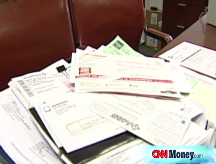Credit squeeze: SBA loans drop 30%
Bank standards are tighter and small companies are leery of taking on new debt, according to SBA officials.
(CNNMoney.com) -- A growing number of businesses are struggling to land loans through the Small Business Administration's flagship lending program. The number of 7(a) loans given in the 2008 fiscal year, which ended Sept. 30, dropped 30% from 2007, the SBA reported last week.
The total dollar amount funneled through the program also fell, but not as sharply. The SBA backed 69,434 loans in 2008 (down from 99,606 in 2007) totaling $12.67 billion. That's an 11% drop from the $14.29 billion in loans the SBA backed in 2007.
The SBA doesn't directly fund 7(a) loans; instead, it offers a guarantee on a percentage of the loan, an incentive intended to make banks more willing to risk lending to fledgling businesses. SBA director of financial assistance Grady Hedgespeth said the lending decline reflects both banks' tightened credit standards and less demand from business owners.
"Small businesses are less inclined to take more debt onto their balance sheet," Hedgespeth said. "The decline in the number of loans is due to fewer small loans in our portfolio. There is still a healthy demand for larger loans, from more established businesses. That's a good sign."
But some business owners say actually securing SBA-backed bank loans is an increasingly daunting process. For the last three years, entrepreneur Andrew MacDonald has run Los Angeles-based Keystone Payments, a company that helps other businesses process credit cards. This year, he decided to buy another company that services the oil and gas industry.
He began the process of seeking a $3 million loan in June but ran into his first obstacle almost immediately: the SBA lending limit is $2 million for all industries outside of manufacturing.
Then, the six banks he approached told him that, due to SBA rules, they couldn't offer him a loan unless he took a lien on his house. He found three banks that didn't indicate up front that a lien was necessary, but once MacDonald delved more deeply into the loan proceedings, he realized that these banks, too, would put a lien on his house.
The SBA's Hedgespeth says that the terms of SBA loans vary according to the business. Although banks are not forced to put liens on personal assets, they are encouraged to, which may also contribute to the declining number of loans.
"More borrowers are less credit worthy compared to a year ago due to housing problems," Hedgespeth said.
MacDonald finally settled on a bank and now, with his home on the line, he is praying that the $2 million loan comes through. He's planning on making up the difference by paying $500,000 in cash and asking the seller to carry a note for the other $500,000.
"Though I meet the requirements, many will not, because home values have declined and that's the collateral these lenders want," MacDonald said. "In commercial banking, a personal guarantee is accepted, and not as punitive as a lien. I think the SBA makes it uncomfortable for the small business owner to seek a loan, rather than encouraging them."
Considering the current state of the economy, MacDonald is nervous about the loan getting cleared. He believes he's got a 50/50 shot of the bank coming back with bad news because there's simply no cash to give out.
"I'm in the middle of a tornado," he said. "If this falls apart, I'll have spent $75,000 in lawyer and appraiser fees needed to file my application that I'll never get back." ![]()
Online loans and credit cards keep companies afloat
8 places to get cash when the bank says no
Pick one: Your business or your house
-
The Cheesecake Factory created smaller portions to survive the downturn. Play
-
A breeder of award-winning marijuana seeds is following the money and heading to the U.S. More
-
Most small businesses die within five years, but Amish businesses have a survival rate north of 90%. More
-
The 10 most popular franchise brands over the past decade -- and their failure rates. More
-
These firms are the last left in America making iconic products now in their twilight. More












